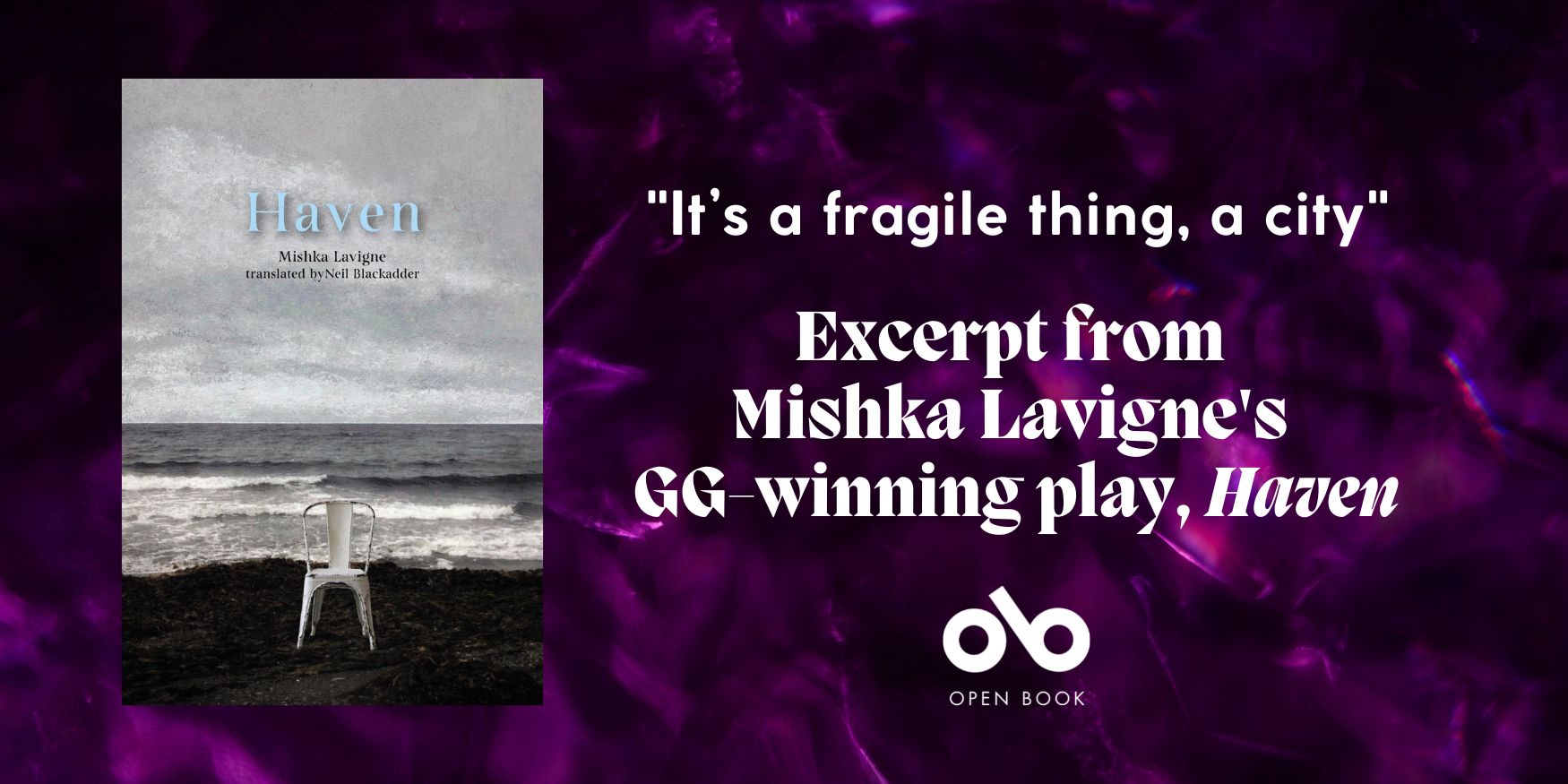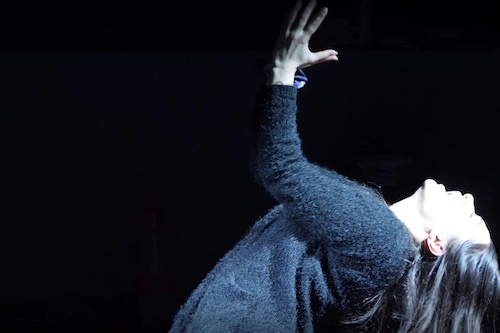Read an Excerpt from Mishka Lavigne's GG-Winning Play, Haven, in Which Two Strangers Connect in an Unexpected Way
In Mishka Lavigne's Haven (Playwrights Canada Press, translated by Neil Blackadder), which won the 2019 Governor General’s Literary Award for Drama in its original French, the audience meets Elsie and Matt, who are each navigating complex losses: Elsie is mourning the loss of her novelist mother while Matt is doing everything he can to recover lost memories of his difficult childhood in the former Yugoslavia. Each one is isolated by both circumstances and choice, aching to find something they're not quite able to name.
An uncanny event brings them together when a sinkhole swallows an entire car – a car which happened to contain the only copy of Elsie's mother's final novel. Matt, a city engineer, investigates, and he and Elsie are instantly, electrically connected in their shared grief and an unspoken, indefinable recognition.
An exploration of loss, chance, connection, and memory, Haven is a play of great depth and subtlety. Guided by Lavigne's deft insights, which have earned her widespread acclaim and numerous awards, Haven takes its audience on a journey through the twistier corners of the human heart.
You can get a glimpse into this singular play, at the moment when Elsie and Matt first spot one another, today with an excerpt courtesy of Playwrights Canada Press.
Excerpt from Haven by Mishka Lavigne, translated by Neil Blackadder:
Elsie
The hole in the street.
On the first day
police
yellow tape saying DANGER
on the second day
nothing
on the third day
the city
orange cones
a sign
DANGER
a brochure for the residents of the street
“The Emergency Construction and You”
be ready to evacuate at any moment if you’re asked to
if the DANGER is too great.
On the fourth day
the day after the funeral
a man wearing a white hard hat and carrying a surveyor’s equipment
on the fifth day
nothing
on the sixth day
nothing
on the seventh day
a new kind of cone.
I’m on leave.
My colleagues from the university call me one at a time.
So do my friends. One at a time.
Geneviève, she calls me every day
always at the same time.
Day 8 since my mother’s death.
I’m sprawled out on my balcony.
The air is heavy.
The sky is grey
almost white.
In the street: there he is again.
The surveyor surrounded by his team and his trucks.
A child in a sandbox.
He lifts his head in my direction.
His eyes in my eyes.
We look at each other.
Rooted to the spot.
In the distance, you can hear the rumbling of thunder.
The wind is picking up.
A woman from his team goes over to him taps him on the shoulder
startling him.
He goes off with the woman but first
he gestures to me
a little greeting
with his thumb and two fingers on the edge of his white helmet.
A cowboy surveyor.
Matt
I firmly attach the cables
I buckle on my harness
and I start descending into the gulf.
I’m suspended above the abyss and the red car crashed at the bottom of the hole.
Your CanLit News
Subscribe to Open Book’s newsletter to get local book events, literary content, writing tips, and more in your inbox
Elsie
From my balcony
I hear him shout “Down!”
Matt
I’m in the hole
it’s humid
an insect climbs up my boot.
I look up at the sky as it turns darker and darker, shaped by the walls of the hole.
The storm is approaching.
I’m in the belly of the city.
Here
The disemboweled street
and images of the streets of Sarajevo
one on top of the other.
I touch the walls of the hole
and the earth crumbles under my fingers.
It’s a fragile thing a city
beneath the concrete and the asphalt and the skyscrapers.
Elsie
From the street
his team lowers a big box down to him.
Matt
Chains, S-hooks, nylon straps tested at 6,000 pounds.
I attach the red car.
I check and double-check the chains and the hooks
so there’s no DANGER when our crane’s ready to pull the car out of the hole.
The owner of the car’s been traced using the papers that were inside.
He came to the city office
took the bag they gave him with the stuff from the car.
But now I look
and under the driver’s seat
well hidden
there’s a book with a blue and white cover.
I get hold of the book, pull it out, look at it.
The image on the cover, under the round stain from a coffee cup:
silhouettes of blue buildings on a white background
like veins.
The title, in a darker blue
Haven
and the name of the author
Gabrielle Sauriol.
Gabrielle Sauriol...
Her name on the TV screens at the airport
her car accident
her funeral
she’s everywhere just recently.
A note inside the book about the image on the cover says: “Sarajevo, impressions. Drawing by the author.”
A first drop of rain slams down right in the middle of the cover.
Elsie
The surveyor comes back up out of the hole and throws something into his pickup.
He gives a signal to the others and to the sound of the engines
the red car is lifted up like a rag doll
From inside the car
pieces of the disintegrated city rain down.
The crane sets the corpse of the car down on a tow truck.
My stomach turns.
All at once, the storm lets loose.
The rain gets heavier and heavier.
The cowboy surveyor gives a signal to his people
and they all move off
crane
tow truck
trucks everyone goes leaving behind
the two different kinds of cones
and the yellow police tape (DANGER) under the pelting rain.
______________________________________________
Excerpt from Mishka Lavigne's Haven, published by Playwrights Canada Press. Copyright Mishka Lavigne, 2022. Reprinted with permission.
Mishka Lavigne (she/her) is a playwright, screenwriter, and literary translator based in Ottawa/Gatineau. Her plays have been produced and developed in Canada, Switzerland, France, Germany, Australia, Haiti, and the United States. Her play Havre was awarded the 2019 Governor General’s Literary Award for Drama (French). Her play Copeaux, a movement-based poetic creation piece with director Éric Perron, premiered in Ottawa in March 2020 and was also awarded the Governor General’s Literary Award for Drama in 2021 as well as the Prix littéraire Jacques-Poirier—Outaouais. Albumen, her first play written in English, received the Prix Rideau Award for Outstanding New Creation in 2019 and the QWF Playwriting Prize in 2020. Mishka is currently working on a bilingual opera libretto with Montreal composer Tim Brady and on two new creations in French, as well as on some translation and screenwriting projects.
Neil Blackadder translates drama and prose from French and German. His translations of plays by Mishka Lavigne, Lukas Bärfuss, Ewald Palmetshofer, and Rebekka Kricheldorf have been produced in London, New York, Chicago, and elsewhere, and many others have been published and presented in staged readings. His translations of prose have appeared in journals including Two Lines, Tupelo Quarterly, and Chelsea. Other playwrights Neil has translated include Evelyne de la Chenelière, Ferdinand Schmalz, Thomas Arzt, and Maxi Obexer. Neil has been awarded grants by the National Endowment for the Arts, PEN, and the Howard Foundation, and held residencies at the Banff Centre and Art Omi.






